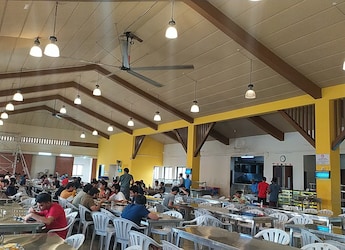Let's take a look at the three pillars of civilization - energy, transportation, and food. Over the last 100 years, significant changes have been made to make energy and transportation more sustainable to support future populations. However, our food systems still rely on the inefficient use of animals and animal products, which leads to water insecurity, food shortage, and climate change. If we do not adopt better food systems, there will be a worldwide food crisis by 2050. (United Nations Statistics).
World-wide as the conversations about climate change are taking centre stage, very few of them are addressing the elephant in the room - the food on our plates and how significantly it impacts the climate. Animal agriculture is the second-largest contributor to human-made greenhouse gas emissions after fossil fuels. According to the UN FAO, about 14.5 percent of global greenhouse emissions can be attributed to the livestock sector annually, which to put into perspective is equivalent to the emissions from all the fuel burned by all the world's transport vehicles, including cars, trucks, trains, boats, and airplanes combined. Any kind of production or processing consumes energy and in turn, emits greenhouse gases. Food is no exception.
- 9.87 kg of carbon dioxide is released to produce 1kg of Poultry Meat
- The CO2 emission is 4.67 kg to produce 1kg of Eggs and 3.15 kg to produce 1kg of Milk
- The CO2 emission is less than 2 kg to produce 1kg of all the plant products.
(Source: ourworldindata)
And this is just the production and processing of these food products. There are also a lot of greenhouse emissions in the supply chain process including packaging, transportation, storage, etc. Food disposal is another huge aspect in this context. Anything plant-based will always degrade with the least emissions while meat-based products will emit multiple times more greenhouse gases.
It is important to understand that climate change is no longer just dependent on big techs and industries. As individuals, we play a significant role, and our behaviours matter too. Our diet is likely our biggest source of climate emissions, and eating mindfully is no longer an option; it is a necessity The main thing you can do to reduce your carbon footprint is to eat less meat. Here are some actionable tips that you can follow to eat better for the planet:
1. If you are a non-vegetarian, start cutting down on animal products that you would not miss in your diet.
2. Aim to include at least 6-7 plant-based protein sources in your diet. These can be very easy and inexpensive in India with our variety of different legumes, beans, and pulses. Eating a variety of protein sources will be helpful when seeking to make a change in the longer term.
3. Eat seasonal and local veggies whenever possible. Seasonal and local vegetables require fewer fertilizers and resources to grow and generally have lower carbon footprints.
4. Be vocal about eating mindfully. If you follow a plant-based diet and educate others, you can be a resource for other vegan curious people.
There are so many communities and cultures around the world that have been following a vegan or vegetarian diet for ages. It's time that we do too. It has become an absolute necessity to work for better food systems to avoid a major hunger crisis and reverse climate change. It's time we eat to beat climate change.
About the Author: Shraddha Bhansali is the COO and co-founder at EVO Foods. A passionate foodie and sustainability entrepreneur, she previously owned and operated a vegetarian restaurant and bar in Mumbai called Candy & Green. Her entrepreneurial spirit has been recognized by the likes of Forbes who have included her in their 30 under 30 list for India 2018 and for Asia in 2021. An avid sustainability activist she has given a TEDx talk and serves as the Sustainability and CSR head for the National Restaurant Association of India (Youth Committee). Through Evo Foods, Shraddha aims to provide sustainable and cruelty-free food options to the end consumer
Disclaimer: The opinions expressed within this article are the personal opinions of the author. NDTV is not responsible for the accuracy, completeness, suitability, or validity of any information on this article. All information is provided on an as-is basis. The information, facts or opinions appearing in the article do not reflect the views of NDTV and NDTV does not assume any responsibility or liability for the same.
